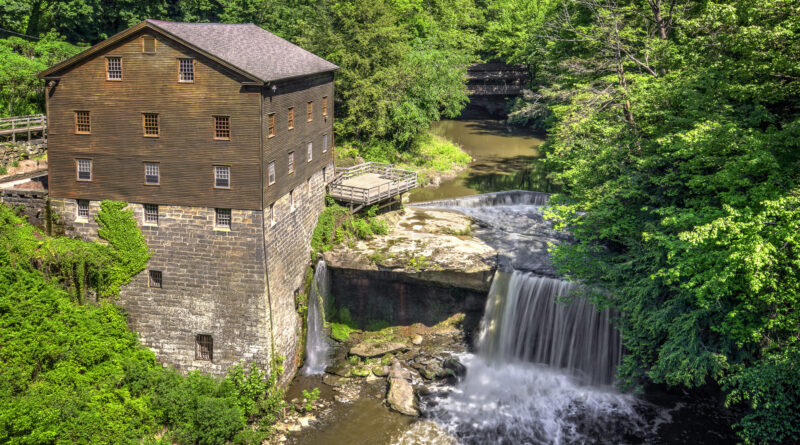Lanterman’s Mill In Youngstown Ohio
Nestled amidst the scenic beauty of Mill Creek Park in Youngstown, Ohio, Lanterman’s Mill stands as a timeless testament to the region’s industrial past. Built over two centuries ago, this historic mill has become an iconic landmark, attracting visitors from near and far. With its picturesque setting and fascinating history, Lanterman’s Mill weaves together the stories of the early pioneers, the industrious spirit of the past, and the preservation efforts of the present.
Early Beginnings of Lanterman’s Mill
Lanterman’s Mill finds its origins in the early 1800s, during a time when the Youngstown area was rapidly developing due to its abundant natural resources. German immigrant and millwright, Wilhelm Wetzel, constructed the original mill on the site in 1845, harnessing the power of the flowing waters of Mill Creek to operate the machinery.
The Flourishing Lanterman’s Mill
In 1853, German-born developer and entrepreneur, German Lanterman, purchased the mill and expanded its operations, transforming it into a highly successful flour mill. Lanterman’s Mill thrived, becoming a vital hub for the surrounding community’s agricultural and industrial needs. The mill’s reputation for producing high-quality flour spread far and wide, leading to its inclusion in the Youngstown industrial boom of the late 19th and early 20th centuries.
Renewal and Restoration
Following years of operation, Lanterman’s Mill faced decline due to changes in milling technology and a series of devastating floods. However, recognizing its historical significance, the park management initiated a restoration project in the 1980s. Skilled craftsmen and historians meticulously rebuilt the mill, ensuring that its original character and architectural elements were faithfully preserved.
The Mill Today
Today, Lanterman’s Mill stands as a captivating living museum, allowing visitors to step back in time and experience the days of old. Its picturesque red sandstone structure, adorned with a wooden waterwheel, provides a stunning visual backdrop against the natural beauty of the surrounding park.
Inside the mill, visitors can witness the traditional milling process, as the massive waterwheel powers the grinding stones to produce flour. The mill’s interior is furnished with historical artifacts, including milling equipment and photographs, offering a glimpse into the past.
Exploring the grounds around Lanterman’s Mill, visitors can also discover the Covered Bridge, constructed in 1989, which adds to the charm and historical ambiance of the area.
Preserving History for Future Generations
Lanterman’s Mill continues to be an important symbol of Youngstown’s heritage, celebrating its industrial roots and the determination of its early settlers. The mill serves as a reminder of the region’s industrial prowess and the transformative role it played in shaping the community.
Through the dedicated efforts of Mill Creek Park, Lanterman’s Mill remains a cherished destination, fostering a deeper understanding and appreciation for the area’s history and cultural legacy.
Conclusion
Lanterman’s Mill stands tall as an enduring landmark, bridging the past with the present. Its rich history and picturesque setting offer visitors a chance to connect with the region’s industrial heritage. From its humble beginnings as a flour mill to its present-day role as a beloved attraction, Lanterman’s Mill remains a testament to the ingenuity and perseverance of the people who shaped Youngstown, Ohio.




